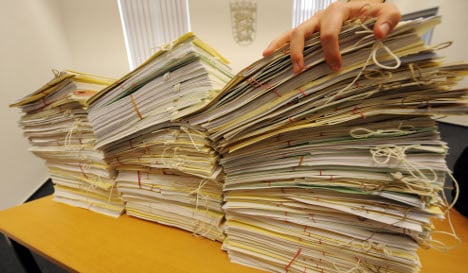Me and German bureaucrats, we’re getting along these days. It’s been a confusing trip down a long hallway full of doors leading to dusty offices, but I’ve finally arrived at a sort of administrative Zen.
I now get all the Stempel, or official stamps, I need. And if you’re familiar with German bureaucrats, a sub-species of mankind known in scientific circles as Homo teutonicraticus or colloquially as Beamten, you’ll realise it’s me that’s changed, not them.
That’s because Beamten have been the same since the first Kaiser took a number in order to have his new title and official seal added to some fancy Urkunde.
Early on in my tour of duty in Germany, I found all the bureaucracy absurd and decided to stage my own personal revolt. At the time, I saw Beamten as the cause of this epic futility and began devising a silent protest. Any time I needed anything – a renewal on my residency permit, a driving licence or even unemployment – my passive-aggressive mind would review the list of paperwork required (your average space shuttle launch requires less) and pick out the document I deemed least important for the approval.
I would then leave that document at home.
Which is good, because it meant I knew right where the paperwork was after my application was rejected. It was easy to locate when I took another day off to go back and try again, this time with all the documentation required. But after a half-dozen of these pointless repeat excursions, I realised I was hurting my reputation at work for taking so much time off to wrangle with the bureaucracy.
And so, I switched to a new Get-the-Beamten game.
I had noticed that most Germans at various municipal offices showed up with entire libraries of documents, sometimes bringing a friend to help carry the numbered, alphabetical stacks of grey Leitz binders, which were then lined up on an official’s desk like an East German military parade.
So I decided to bring just a huge, generic stack of documents, as well as all the paperwork required for whatever it was I was trying to get done. How is that a game, you ask? I quickly discovered that the large stack of papers alarmed the bureaucrats. It scared them.
This is because before you enter their office, they are already hoping they can quickly dispatch you on a technicality. But when you show up with a large stack of documents, it dashes their hopes before you have even said a word.
When I sat down and explained my situation, they feebly requested a document or two from their list, all the while nervously eyeing my stack. But after I produced the first two, they would usually give up and proceed with the task at hand. I counted not having to show them all the required documentation as a victory, even if I had to rent a moving van to bring all that paperwork.
But my brushes with Beamten still didn’t always go smoothly. Sometimes we would end up in discussions about the documents I brought and I would raise my voice a little, attempting to bulldoze them linguistically to get my way. They would counter with condescension, which I would parry with a request to talk to their supervisor. As you can imagine, this often resulted in me not getting my Stempel and having to come on another date to finish my business.
My boss was not amused about my new little hobby.
But in a recent brush with the Finanzamt, the German tax man, I took a different tack. When things started getting bumpy and the Beamtin pulled out her big can of condescension, I remained calm. Pleasant. Collected, even, but just this side of subservient.
Her face relaxed. Her tone changed. There was no more smugness. She even became helpful. She offered tips. For a moment, I thought there might even be a chance we would become friends.
I discovered all my previous wailings had been wrong. They had aroused contempt deep within the Beamten heart. I now know the thing to do – when you’re sitting on a cheap office chair and suddenly find a red-faced bureaucrat across a downmarket desk. You want to smile and show them you know who’s boss. It’s simple. They are.
Once the relationship is clear, it’s as if the relationship can be dissolved. The boundaries come down. Sure, you say, the Beamten won. They beat me down. But I say you’re wrong – I win because they no longer have a chance to reject or condescend to me. They know I know their game and the best we can both hope for is a draw.
With that out of the way, I’m now going to try to figure out German supermarket cashiers.
Since a good German Stammtisch is a place where pub regulars come to talk over the issues of the day, Portnoy welcomes a lively conversation in the comments area below.



 Please whitelist us to continue reading.
Please whitelist us to continue reading.
Member comments